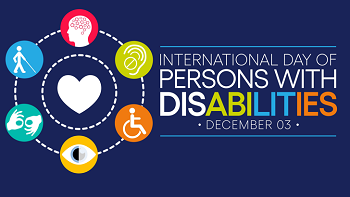Disability employment claims higher than any other category
3 December 2023
Polfed News

Forces must do more to eliminate unlawful discrimination, harassment or victimisation of disabled police officers as part of their legal responsibility, as figures reveal almost half (46 per cent) of employment tribunal claims funded by PFEW are disability cases.
To mark International Day of Persons with Disabilities today (December 3), focusing on importance of inclusivity, PFEW wants to raise awareness on the lack of progress made by forces 20 years on since the introduction of disability discrimination legislation in the police service in 2004.
As of October, this year PFEW has already spent at least £1,115,000 supporting members in disability-related employment claims.
Out of the 293 employment tribunals, accurate as of 8 November, 136 heard evidence from impacted police officers – as well as PFEW reps and solicitors backing them - who faced issues with their force when it came to working with a disability.
Of particular concern is the unlawful treatment of officers placed on adjusted duties, where reasonable adjustments should be made for them to continue working their full hours in a substantive role, and annually reviewed.
Continuing to press for better treatment for officers with disabilities, PFEW Equality Lead Ian Saunders said: “The level of understanding by forces of what they must do to support disabled officers is woeful. Police officers have absolute rights to have reasonable adjustments in the workplace, yet across the country we see disabled officers being side-lined out of the job they want to do.
“We believe all managers in the service should be trained in the employment provisions of the Equality Act so they understand this is not about the rights of the officer, but the positive obligations placed on the force. This isn’t rocket science, but the perception of disabled people as not being up to the job of being a police officer is pernicious and lingering in the service.
“From 1 January next year the definition of a disabled person in terms of employment is changing so it is clearer in a way that will potentially see more police officers benefit from the protections of the Equality Act. The figures on what we spend supporting our members to bring a claim against their force are just a snapshot of how we support our members and solve problems for disabled officers, but they do show our commitment.
“We would, however, rather not have to spend so much time and money - which we could do if forces finally get a grip of this and realise it is better to understand and plan around the law rather than ignore it and bully and discriminate against far too many of their own officers.”
Tracey Betts, president of the Disabled Police Association (DPA), said: “The Disabled Police Association supports the work of PFEW in highlighting this issue and agrees with the challenge to forces to not only understand the reasons we in policing still struggle to get the basics, such as appropriate adjustments, right but to take direct and immediate action to address this. Proper understanding by our first and second line supervisors of our responsibilities under the Public Sector Equality Duty and the Equality Act are key in this regard.
“We in the DPA hear every day, stories of discrimination and victimisation of those who have a diverse ability, difference or disability. Although senior leaders encourage us to talk about who we are by using such messaging as in the ‘Safe to Say’ campaign, in some forces, there is still a mistrust of those who step forward and have the courage to do this. When we see the statistics provided by the Federation, it is clear we still have a huge problem.
“Officers should seek support from their local Enable or Disability networks and our senior leaders should be meaningfully engaging with those networks, listening to their staff and taking the experiences of those who are victims of disablist treatment in the workplace as seriously as they would sexism, racism, or homophobia.
“Forces can demonstrate their commitment to change by adopting the DPA’s 12-point plan, a guide for all forces to understand the needs of officers and build a truly inclusive culture.”
A member who considers they may have been discriminated against on any of these grounds should contact their Federation office as a matter of urgency, where a fully trained equality liaison officer will be there to support and advise.
















